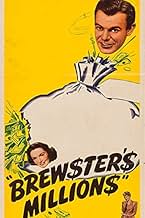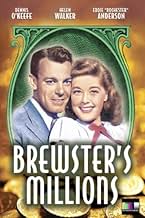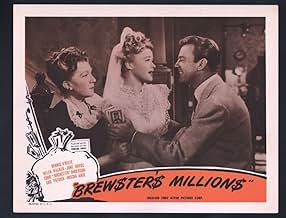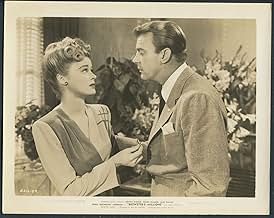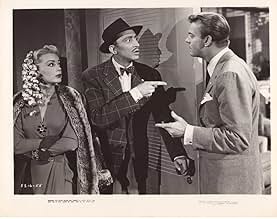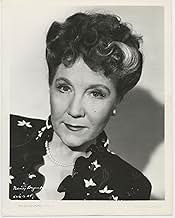IMDb-BEWERTUNG
6,6/10
1581
IHRE BEWERTUNG
Um sieben Millionen Dollar zu erben, muss ein ehemaliger Soldat in zwei Monaten eine Million Dollar ausgeben.Um sieben Millionen Dollar zu erben, muss ein ehemaliger Soldat in zwei Monaten eine Million Dollar ausgeben.Um sieben Millionen Dollar zu erben, muss ein ehemaliger Soldat in zwei Monaten eine Million Dollar ausgeben.
- Für 1 Oscar nominiert
- 1 Nominierung insgesamt
Eddie Acuff
- Cab Driver
- (Nicht genannt)
Chester Conklin
- Stage Doorman
- (Nicht genannt)
Joseph Crehan
- Notary
- (Nicht genannt)
Helen Dickson
- Woman at Yacht Party
- (Nicht genannt)
Eddie Dunn
- Police Detective
- (Nicht genannt)
Jay Eaton
- Hold-Up Victim
- (Nicht genannt)
Empfohlene Bewertungen
Dennis O'Keefe never became a top-tier star and today is mostly forgotten. It's a shame, as although he may not have had 'the look', he was quite enjoyable in gangster and light comedy films. Here, he and decent dialog manage to take a silly plot and make it worth watching.
The film begins with Monty Brewster (O'Keefe) coming back home after the war. He plans on marrying his sweetie, Peggy (Helen Walker) and settling down to a happy life. However, he soon is contacted by a lawyer. Apparently a VERY eccentric distant uncle has died and left his $8,000,000 to Monty...IF he manages to spend a million of it in two months. Supposedly it's to make him appreciate the value of money and make him sick of spending--though this makes no sense. He also cannot give much of the money to charity. In the process, a funny thing happens...the more he invests in stupid schemes, the more money he seems to make!! And, Peggy is getting sick of him because Monty is NOT allowed to divulge the crazy conditions of the will.
While the film goes a bit overboard when Monty starts acting crazy when he can't get rid of his money, it's a fun and frenetic film. Not deep or sophisticated--just funny. So, provided you can just turn off your brain and enjoy, you'll like this film very much.
The film begins with Monty Brewster (O'Keefe) coming back home after the war. He plans on marrying his sweetie, Peggy (Helen Walker) and settling down to a happy life. However, he soon is contacted by a lawyer. Apparently a VERY eccentric distant uncle has died and left his $8,000,000 to Monty...IF he manages to spend a million of it in two months. Supposedly it's to make him appreciate the value of money and make him sick of spending--though this makes no sense. He also cannot give much of the money to charity. In the process, a funny thing happens...the more he invests in stupid schemes, the more money he seems to make!! And, Peggy is getting sick of him because Monty is NOT allowed to divulge the crazy conditions of the will.
While the film goes a bit overboard when Monty starts acting crazy when he can't get rid of his money, it's a fun and frenetic film. Not deep or sophisticated--just funny. So, provided you can just turn off your brain and enjoy, you'll like this film very much.
An archetypal fast and furious, beat-the-clock screwball comedy based on a typically offbeat idea of a returning soldier standing to inherit millions if he can spend a million dollars in two months, but not tell anyone in the process. Cue a procession of hair-brained supposedly dead-duck schemes and investments which naturally come good to thwart our hero's plans until things right themselves by the end.
The basic idea is a good one and you suspect in the hands of a Frank Capra or Preston Sturges could have been wrung for more laughs and one suspects a bit deeper social comment, this failing exposed none more so than when Brewster's overnight largess to his black servant is to offer him a lackey's job for life, just after he's thrown tens of thousands of dollars at the rest of his nearest and dearest.
For me the pacing was just too frenetic and while likable enough the lead actors lacked the personality and timing of the recognised A-list acting talent of the day. Plus, I have to say the crudely deferential treatment of said black man-servant, all loud wise-cracks and "Yass boss, no boss" dates the film horribly.
But putting that to one side, this is a rollicking, occasionally humorous and engaging Golden Age comedy, worth diverting 75 minutes of your time for.
The basic idea is a good one and you suspect in the hands of a Frank Capra or Preston Sturges could have been wrung for more laughs and one suspects a bit deeper social comment, this failing exposed none more so than when Brewster's overnight largess to his black servant is to offer him a lackey's job for life, just after he's thrown tens of thousands of dollars at the rest of his nearest and dearest.
For me the pacing was just too frenetic and while likable enough the lead actors lacked the personality and timing of the recognised A-list acting talent of the day. Plus, I have to say the crudely deferential treatment of said black man-servant, all loud wise-cracks and "Yass boss, no boss" dates the film horribly.
But putting that to one side, this is a rollicking, occasionally humorous and engaging Golden Age comedy, worth diverting 75 minutes of your time for.
This is a harmless screwball romp (one of the last of its kind) from the '40s starring DENNIS O'KEEFE as a man who, to satisfy the whim of a wealthy relative, has to spend $1,000,000 within a short amount of time in order to qualify for a $7,000,000 inheritance.
The script makes sure that he has a hard time ridding himself of dough. Seems everything he touches suddenly has the Midas touch. It's stretching it a bit when he even gets a telephone call from some radio show blithely announcing that he just won $25,000. It should happen to all of us, most of whom are still waiting for the Prize Patrol to show up at our door from Publisher's Clearing House.
Anyway, the script makes sure that O'Keefe has to mug his way through many hapless situations involving show biz connections, a fancy yacht, horse racing, everything that conceivably could give him a chance of losing money--but of course there's a happy ending.
Nice to see so many '40s players in the supporting roles. HELEN WALKER, NEIL HAMILTON, JOHN LITEL, JUNE HAVOC,MISCHA AUER, GAIL PATRICK, EDDIE "ROCHESTER" ANDERSON among others.
Allan Dwan directed and keeps things moving at a fast clip. And whatever happened to DENNIS O'KEEFE? He was a good light comedian and did a lot of straight dramatic roles too. Then suddenly he was out of sight in the movies, swallowed up by television for most of his career.
The script makes sure that he has a hard time ridding himself of dough. Seems everything he touches suddenly has the Midas touch. It's stretching it a bit when he even gets a telephone call from some radio show blithely announcing that he just won $25,000. It should happen to all of us, most of whom are still waiting for the Prize Patrol to show up at our door from Publisher's Clearing House.
Anyway, the script makes sure that O'Keefe has to mug his way through many hapless situations involving show biz connections, a fancy yacht, horse racing, everything that conceivably could give him a chance of losing money--but of course there's a happy ending.
Nice to see so many '40s players in the supporting roles. HELEN WALKER, NEIL HAMILTON, JOHN LITEL, JUNE HAVOC,MISCHA AUER, GAIL PATRICK, EDDIE "ROCHESTER" ANDERSON among others.
Allan Dwan directed and keeps things moving at a fast clip. And whatever happened to DENNIS O'KEEFE? He was a good light comedian and did a lot of straight dramatic roles too. Then suddenly he was out of sight in the movies, swallowed up by television for most of his career.
Hook these folks up to a generator and there's enough high energy to light up a city. It's the nutty premise, of course, that carries the movie. Brewster (O'Keefe) must squander a million in order to inherit seven. Trouble is that he can't seem to squander it fast enough— the money comes back faster than it goes out. What a predicament, as the audience wonders what they would do in his place.
It's the wacky idea of giving money a negative value that's so engaging. It's like the economic counterpart to disbelief in religion, and we see that in the astonished reactions to Brewster's unorthodox behavior. After all, in a monetary economy money amounts to something of a secular god. So, simply getting rid of it heedlessly looks not only like an act of disbelief, but also of rank insanity. The comedic set-ups flow from this central idea, as time grows short and Brewster grows increasingly frantic.
Too bad O'Keefe has been largely forgotten. Though not front-rank, he's quite good at working himself into a humorous lather. Those two uninhibited farces Getting Gertie's Garter (1945) and Up in Mabel's Room (1944) are also lots of fun thanks to both O'Keefe and director Dwan who has a real feel for the material. Hard to think of better wartime escape than this trio of films. Then there's the lovely, star-crossed Helen Walker whose "upside- down" eyes look like no other actress of the period. No wonder Brewster thinks she's worth a million.
The movie's been made a number of times, but never better than here. The fact that all three Dwan comedies were produced by the independent Ed Small Productions likely accounts for their relative obscurity. Too bad because each stands as a talent showcase for its lead star and comedy director, and is still a lot of fun. Especially the one here since last time I checked, we're still in a money economy and Brewster still looks amusingly loony.
It's the wacky idea of giving money a negative value that's so engaging. It's like the economic counterpart to disbelief in religion, and we see that in the astonished reactions to Brewster's unorthodox behavior. After all, in a monetary economy money amounts to something of a secular god. So, simply getting rid of it heedlessly looks not only like an act of disbelief, but also of rank insanity. The comedic set-ups flow from this central idea, as time grows short and Brewster grows increasingly frantic.
Too bad O'Keefe has been largely forgotten. Though not front-rank, he's quite good at working himself into a humorous lather. Those two uninhibited farces Getting Gertie's Garter (1945) and Up in Mabel's Room (1944) are also lots of fun thanks to both O'Keefe and director Dwan who has a real feel for the material. Hard to think of better wartime escape than this trio of films. Then there's the lovely, star-crossed Helen Walker whose "upside- down" eyes look like no other actress of the period. No wonder Brewster thinks she's worth a million.
The movie's been made a number of times, but never better than here. The fact that all three Dwan comedies were produced by the independent Ed Small Productions likely accounts for their relative obscurity. Too bad because each stands as a talent showcase for its lead star and comedy director, and is still a lot of fun. Especially the one here since last time I checked, we're still in a money economy and Brewster still looks amusingly loony.
Home from service in World War II, business-minded Dennis O'Keefe (as Montague "Monty" Brewster) wants to marry curvy blonde sweetheart Helen Walker (as Peggy Gray) right away. The couple has clearly waited long enough. However, a lawyer arrives with news that postpones the nuptials and Mr. O'Keefe's longed-for honeymoon. He has inherited one million dollars from his anthropologist uncle - but there are stipulations. O'Keefe must spend the million in two months to obtain the real prize - seven million dollars. He must not reveal the will's million-dollar detail to anyone, including Ms. Walker. His deceased uncle believes O'Keefe should "learn to hate spending money." O'Keefe thinks spending the million will be a "cinch," but you know otherwise...
"Brewster's Millions" is a fun, fast-paced version of the classic story...
By speed-reading the lead performance, O'Keefe and director Allan Dwan help make it more believable; if you stopped to catch your breath, you would likely think of some better ways to spend the million. This also distracts from the fact that the self-described "poor" couple already look like millionaires - they are beautifully-dressed, live in what looks like a mansion and are waited on by loyal Eddie "Rochester" Anderson (as Jackson). By the way, Mr. Anderson infuses his role with more dignity than expected. Another obvious strength is Mr. Dwan giving the old stage play an almost three-dimensional quality. Observe, for example how Dwan introduces Anderson through a soapy window. And throughout the film, Dwan uses his sets, cameras and players exceptionally well.
******** Brewster's Millions (4/7/45) Allan Dwan ~ Dennis O'Keefe, Helen Walker, Eddie 'Rochester' Anderson, June Havoc
"Brewster's Millions" is a fun, fast-paced version of the classic story...
By speed-reading the lead performance, O'Keefe and director Allan Dwan help make it more believable; if you stopped to catch your breath, you would likely think of some better ways to spend the million. This also distracts from the fact that the self-described "poor" couple already look like millionaires - they are beautifully-dressed, live in what looks like a mansion and are waited on by loyal Eddie "Rochester" Anderson (as Jackson). By the way, Mr. Anderson infuses his role with more dignity than expected. Another obvious strength is Mr. Dwan giving the old stage play an almost three-dimensional quality. Observe, for example how Dwan introduces Anderson through a soapy window. And throughout the film, Dwan uses his sets, cameras and players exceptionally well.
******** Brewster's Millions (4/7/45) Allan Dwan ~ Dennis O'Keefe, Helen Walker, Eddie 'Rochester' Anderson, June Havoc
Wusstest du schon
- WissenswertesUpon its original release, the film was banned in Memphis, Tennessee, where officials found Eddie 'Rochester' Anderson's servant character had "too familiar a way about him" and that the movie overall depicted "too much social equality and racial mixture."
- PatzerPeggy announces she's leaving on Friday, September 13th because that's the day Monty promised they could be married. However, in 1944, September 13th was a Wednesday. They may have gotten mixed up with Monty's birthday being on October 13th, which was actually a Friday in 1944.
- Zitate
Montague L. 'Monty' Brewster: Say, I heard you were in the Navy.
Jackson: So did the Japs. And when they did, there was more Hari-Kari and throat cutting than at a Harlem rent party.
- VerbindungenFeatured in Re-Making Millions (2020)
- SoundtracksWhen Johnny Comes Marching Home
(uncredited)
Written by Louis Lambert
Sung by Eddie 'Rochester' Anderson at the beginning
Top-Auswahl
Melde dich zum Bewerten an und greife auf die Watchlist für personalisierte Empfehlungen zu.
- How long is Brewster's Millions?Powered by Alexa
Details
- Laufzeit1 Stunde 19 Minuten
- Farbe
- Seitenverhältnis
- 1.37 : 1
Zu dieser Seite beitragen
Bearbeitung vorschlagen oder fehlenden Inhalt hinzufügen

Oberste Lücke
By what name was Hilfe, ich bin Millionär (1945) officially released in India in English?
Antwort
